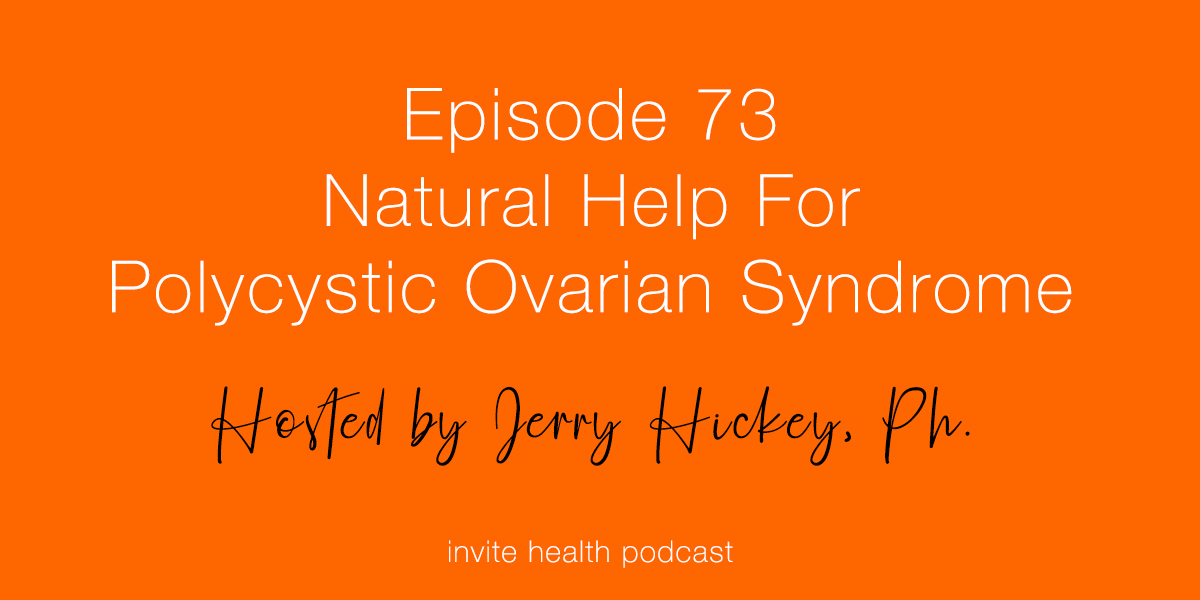Natural Help For Polycystic Ovarian Syndrome – Invite Health Podcast, Episode 73

Invite Health Podcast, Episode hosted by Jerry Hickey. Ph
Subscribe Today!
Women with Polycystic Ovarian Syndrome can truly suffer. They frequently develop diabetes, high blood pressure, acne and facial hair. This condition is not uncommon. Polycystic Ovarian Syndrome, or PCOS, is one of the most common hormonal problems, impacting up to 12% of all women. But, in general, the estimates range from 6-8% of women. This is a big figure!
What causes Polycystic Ovarian Syndrome?
Women with PCOS have metabolic issues. This means that they cannot regulate their androgens, the male hormones like testosterone. They have trouble regulating their estrogen levels, as well. This seems to be because of part of the brain that regulates the bodies hormones and many other things (called the hypothalamus) is not functioning properly. This directly impacts the ovaries, which can develop many cysts;.
Treatment depends on the symptoms. But common signs include:
- Excessive androgen production
- Facial hair
- Acne
- Male pattern baldness, in more severe cases
- A more masculine build
- Polycystic ovaries, or numerous cysts
- Irregular menstrual cycle
Interested in more information on Diabetes? Click here to listen now >>
Complications of PCOS
PCOS is often accompanied by elevated blood sugar and even diabetes. This actually causes an even more increased rise in the level of hormones and low grade inflammation.
Some of the complications of PCOS:
- Infertility
- Fatty liver
- High cholesterol and triglycerides
- Diabetes
- Sleep apnea, due to weight gain and high testosterone
- Depression and anxiety
- Uterine bleeding
- Endometrial cancer in some cases
- Obesity
Your doctor may prescribe birth control pills to help regulate your hormones. Birth control pills reduce the level of male hormone, which can help reduce your risk of endometrial cancer, abnormal bleeding, acne and facial hair. Metformin is sometimes given, which treats your blood sugar, helps regulate ovulation and weight loss. Sometimes doctors will prescribe spirinal lactone, a diuretic commonly used for high blood pressure but it is also “feminising” and can decreases facial hair and acne. You should not take potassium supplements while on this medication.
Lifestyle Changes That Might Help
- Exercise to burn fat and lower your blood sugar
- Eat less carbohydrates
- Avoid sugar
Inositol is a B-complex related nutrient. It is normally used for liver health, brain function and in helping your cells communicate. It is also called myo-Inositol. Since 2008, Inositol became known with PCOS and has been shown to be extremely safe to use. They’ve combined Folate (a B-vitamin) in some studies along with Melatonin (the sleep hormone), and Inositol which has been shown to improve ovulation and fertility in women with Polycystic Ovarian Syndrome.†
NAC is probably the most studied nutrient. There are a number of drugs that are made of our NAC, or nacetyl-cystine. The International Journal of Gynecology report that women on clamafine (used for infertility) with PCOS, researchers added either NAC or L-Carnitine to this medication in 162 women. NAC improved both blood sugar control and both nutrients improved ovulation and pregnancy rates. This supplement has been compared to Metformin due to its benefit for women’s health, especially with PCOS.†
Quercetin – naturally found in tea, broccoli, spinach, oranges and more – as a supplement, has been shown to be helpful in women with PCOS. A study from January 2020, published in the Journal Ovarian Research reviewed three different clinical trials on Quercetin in women with PCOS and found that it reduced testosterone, reduced insulin resistance and participants had better blood sugar control.†
Resveratrol is found in tiny amounts of the skin of red grapes. The Department of Reproductive Medicine at the University of California, San Diego and a bunch of fertility clinics in Madrid, Spain published a study in the Journal the Annals of the New York Academy of Sciences reported that Resveratrol is an antioxidant, an anti-inflammatory agent, it reduces inflammation in the ovaries and helps protect the ovaries from hormones and growth factors.†
Thank you for tuning in to the Invite Health Podcast. You can find all of our episodes for free wherever you listen to podcasts or by visiting www.invitehealth.com/podcast. Make sure you subscribe and leave us a review! Follow us on Facebook, Twitter and Instagram at Invite Health today. We’ll see you next time on another episode of the Invite Health Podcast.

